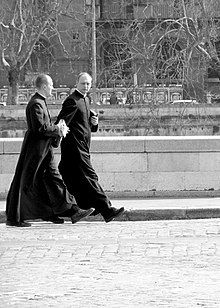Diocesan priest
Diocesan priest , also called secular priest or secular cleric (outdated also popular priest or lay priest ) is a priest in the Roman Catholic Church who is incardinated in a diocese and thus belongs to its clergy . In contrast to this, religious priests are incardinated in their community, live according to the evangelical counsels and the rule or the constitutions of their community and are subordinate to their superior .
Diocesan priests are primarily active in pastoral care in the parishes and special tasks within the diocese. As a rule, they fulfill the classic tasks of the clergy to teach and lead the people of God and to sanctify them through the administration of the sacraments . However, the priests working in a diocese are not necessarily all incardinated there. There are often religious priests or priests from other dioceses who have been commissioned by their superior or their diocesan bishop to serve in another diocese.
All priests of the Roman Catholic Church are under a superior. In the case of the diocesan priest, this is the local bishop . The priest promises celibacy and obedience and reverence to the bishop. He receives his livelihood from his bishop, who also determines the work of the priest.
Diocesan priests differ from religious priests in several ways. Both have received the sacrament of consecration , but the religious priest vows a life according to the evangelical counsels ( poverty , celibate chastity , obedience ), lives according to a rule of the order and is subordinate to a religious superior. The members of a religious community usually wear a habit and thus differ externally from diocesan priests. The diocesan priests, however, are also under canon law obliged to be recognizable as priests by wearing “appropriate church clothing” ( can. 284 CIC ).
